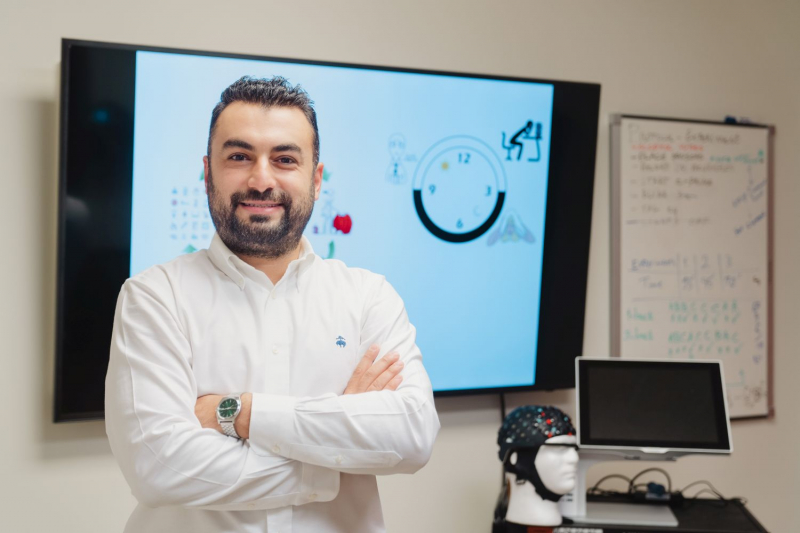Researchers from the Cullen College of Engineering are exploring ways to automate the administration of medicine for patients suffering from Cushing’s syndrome, with a proposal establishing architecture for that recently published in Frontiers in Neuroscience.
The lead author for the paper is Hamid Fekri Azgomi, a doctoral student of Rose Faghih, Ph.D., an Assistant Professor in the Electrical and Computer Engineering Department and director of the Computational Medicine Lab (CML). “Closed-Loop Fuzzy Energy Regulation in Patients with Hypercortisolism via Inhibitory and Excitatory Intermittent Actuation” builds off of the other recent work in Faghih’s lab, which has centered on using wearable technology like smartwatches to track vitals.
A fellow author on the paper is Jin-Oh Hahn, an Associate Professor in the Mechanical Engineering Department at the University of Maryland. In a summary of the paper written by Fekri Azgomi, he outlined the extent of the problem.
“Hypercortisolism, or Cushing’s syndrome, is associated with tiredness and fatigue during the day and disturbed sleep at night. Approximately 13 per million people are affected every year. Cushing’s syndrome most commonly influences adults ages 20 to 50, and it is more frequent in females.”
Surgery is typically recommended for Cushing’s disease — It has a 78 percent success rate. But the relapse rate is about 13 percent. Using medications could help with those patients, as well as those who can’t undergo surgery.
“Due to recent advances in employing novel compounds that can regulate energy state, medical therapy has attracted more attention. Automating the time and dosage of medications that are effective by either enhancing the energy state or lowering it could be one major first step toward treating other hormone-related disorders,” Fekri Azgomi wrote.
“Inspired by the recent advances in wearable technologies, we propose an architecture to track and control internal energy state in Cushing’s patients by monitoring cortisol measurements. We demonstrate how the proposed algorithm and designed control are successful in both inhibiting and exciting the internal energy state in a closed-loop manner. In the proposed architecture, the time and dosage of the medications would be determined based on the individual’s needs and will lead to a more efficient outcome. The results verify the efficiency of the proposed architecture in regulating the energy state in cortisol profiles associated with Cushing’s patients.”
Fekri Azgomi first contacted Faghih about her research in 2018, and to express his interest in it.
“Over the last few years, my main field of research has been on control systems and system identification. Prior to joining the CML, I had experience in applying my background expertise in various fields, such as fault detection in electrical machinery and unmanned aerial vehicles,” he said. “When I contacted Dr. Faghih, I noticed that there could be a unique opportunity for me to apply my expertise in physiological systems and further expand it in biomedical applications. Learning more about the research projects at CML, I understood that I can join into a novel idea that was supported by the National Science Foundation. The exciting part was that I felt, by joining this research team, I could further extend my research fields and bridging engineering and medical sciences. Having this excellent opportunity to explore these high-demand research topics and utilizing my expertise in this multidisciplinary area further motivated me to do my Ph.D. at CML and under Dr. Faghih’s supervision.”
Fekri Azgomi plans to graduate in Fall 2021, having already defended his Ph.D. proposal. He noted that working on several research projects and mentoring multiple students during the pursuit of his doctorate helped him become a multidisciplinary researcher in the areas of computational neuroscience, control systems, signal processing, and biomedical applications.
“My goal is to automate medical practices by applying my background knowledge in control and signal processing,” he said. “I believe there exist opportunities in the medical science problems that could be approached from an engineering perspective.”
Fekri Azgomi said he would like to continue pursuing a career in academia.
“I love to explore novel research ideas and interact with students and researchers from different backgrounds,” he said. “What most excites me is to explore the research gaps and identify solutions within a multidisciplinary framework. While I aim to join academia and work as a university professor, I am also open to enhancing my training to explore other relevant fields of research. With several years of research in the areas of control systems and signal processing, and applying them in biomedical applications and computational neuroscience, I feel pretty confident that I may advance this multidisciplinary field and help society by enhancing the quality of life.”
